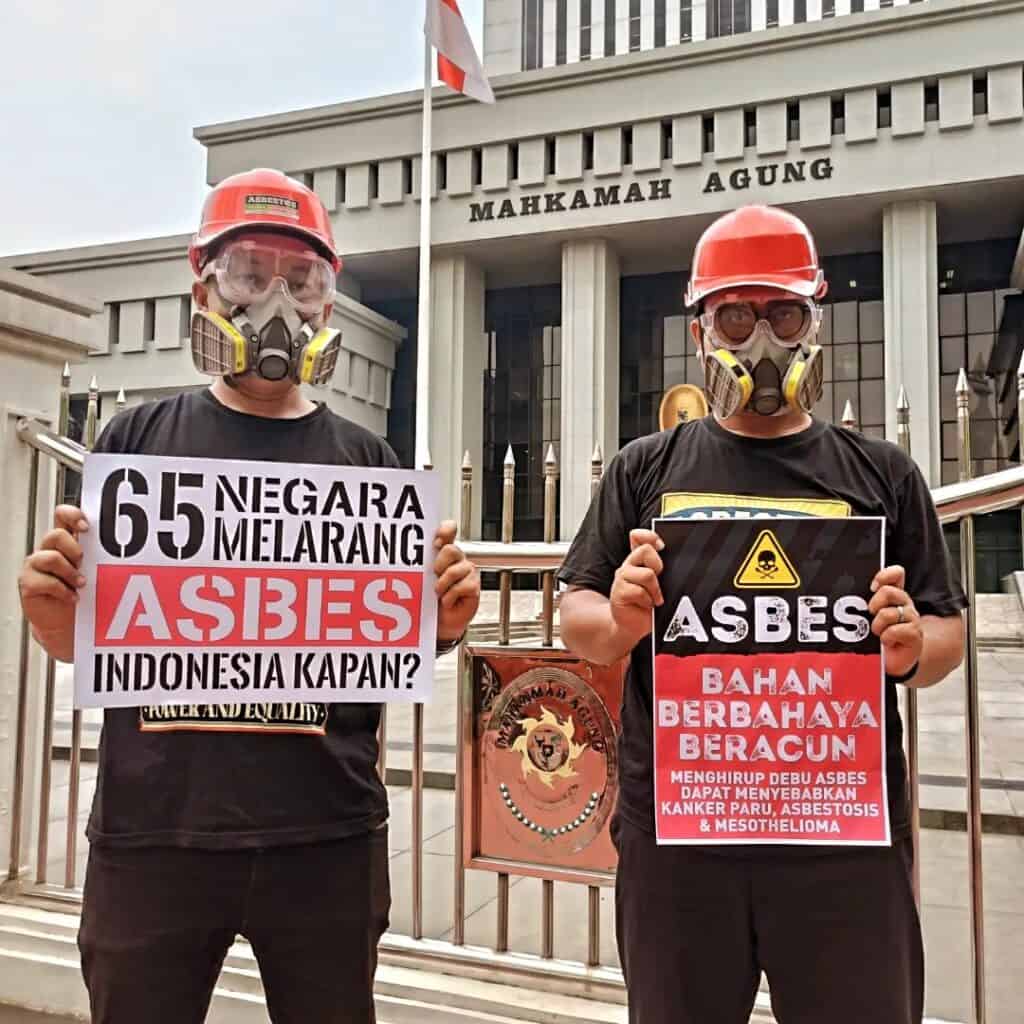
The Central Jakarta District Court has thrown out the lawsuit filed by the asbestos industry association (known as FICMA) against public health activists of the Yasa Nata Budi Institute for Consumer Protection (LPKSM).
LPKSM coordinator Leo Yoga Pranata stated that this victory ensures the public can access products with clear, complete, and understandable information—essential for assessing health risks independently.
“We are very happy with this verdict. It reinforces that asbestos-based roofing must include a label warning of the health dangers of these products. This is clearly a public victory over the profits made by the asbestos industry,” he said.
A win against corporate bullying tactics
This lawsuit was lodged after activists scored a historic win in the Indonesian Supreme Court which sought to implement mandatory labelling and hazard warnings for asbestos-based roofing products in Indonesia. Following the victory, FICMA lodged the lawsuit against LPKSM Yasa Nata Budi and its activists, claiming they had caused harm to the asbestos industry in Indonesia.
But activists won once again.
Court rules: Case beyond District Court’s jurisdiction
In his reasoning, Judge Marper Pandiangan said the lawsuit filed by the asbestos manufacturer’s association and in accordance with Law No.10 of 2013 regarding ratification of the Rotterdam Convention, cannot be decided within its authority.
Such a lawsuit, according to the court, implies a refuting of an earlier Supreme Court decision. Therefore, the judges of the Central Jakarta District Court held that the court did not have the authority to hear the case. In an excerpt from the judge’s ruling, he states that the case “cannot be decided by the District Court, because the authority to examine a law and regulation is the authority of the Supreme Court”.
Ensuring asbestos-containing products labelling
The coordinator of the movement to ban asbestos in Indonesia (InaBan), Moh Darisman, explained that the decision of the Central Jakarta District Court can be seen as the commitment of the Indonesian government to protect the community from diseases caused by asbestos.
“The lawsuit of LPKSM Yasa Nata Budi (to the Supreme Court last year), which is also an InaBAN member, is appropriate and proper. Together with various institutions and experts that make up the InaBAN network, we will continue to monitor and work hard to protect the rights of citizens to live without the threat of asbestos-related diseases,” he said.
“This is a legal alignment that ensures that the state has an interest in protecting its citizens from the dangers of asbestos. There is no more reason for anyone, including the trade ministry, not to comply with placing hazard labels on every asbestos roofing,” he said.
LION Indonesia Executive Director Surya Ferdian in response to the victory of LPKSM Yasa Nata Budistated stated “the move to label asbestos-based roofing products is a moderate step that has also taken into account the interests of employers and workers. The labelling of dangerous products and provision of health protection warnings is a reminder of the company’s responsibility mandated by the constitution,” he said.
“What Yasa Nata Budi did is actually a constitutional reminder for all to take responsibility. It is not only important for the asbestos industry to think about profit, but it is also important to be responsible for the health of its workers and consumers,” he said. “As the World Health Organisation clearly advises, there is no safe level of exposure to asbestos fibre. We urge all manufacturers to transition their production lines out of asbestos and to use safer alternatives that are available”.
LION Indonesia, which has initiated the movement to advocate for the elimination of the risk of asbestos hazards since 2010, will continue to encourage the country to get out of the trap of huge losses due to the use of asbestos in Indonesia.
“We have seen many examples of countries that finally had to cover the health insurance of their citizens due to the high number of diseases caused by asbestos. Don’t let Indonesia experience the same thing,” he said.
Chairman of LPKSM Yasa Nata Budi, Dhiccy Sandewa, explained that his organisation will continue to oversee the victory obtained by his organisation for the wider public interest. According to him, the court victory is only one part of the many other efforts that LPKSM Yasa Nata Budi has prepared to protect consumers from the dangers of asbestos-related diseases.
“This court victory is just one of many steps we have taken to protect consumers from asbestos-related diseases. LPKSM Yasa Nata Budi was created to assist consumers who have used asbestos roofing without complete information about its dangers. The gong has been sounded, now we will immediately enter the next step,” he said.
Ajat Sudrajat, head of the campaign and advocacy division of LPKSM Yasa Nata Budi, said the organisation will soon write to the trade ministry to seek the immediate issuing of the regulation ordered by the Supreme Court that strictly requires hazard labelling on asbestos roofing products.
“This court decision must be respected and upheld. There is no reason for the trade ministry to delay the issuance of the amended regulation to make labelling mandatory. Any delay made on a court ruling means defiance of the law in the Republic of Indonesia. It must be dealt with firmly,” he concluded.
FICMA has 15 days to seek appeal to a higher court.
Note:
The decision was made by Chief Judge Marper Pandiangan in case No.417/Pdt.G/2024/PN Jkt.Pst on 5 February 2025 in the Central Jakarta District Court.
